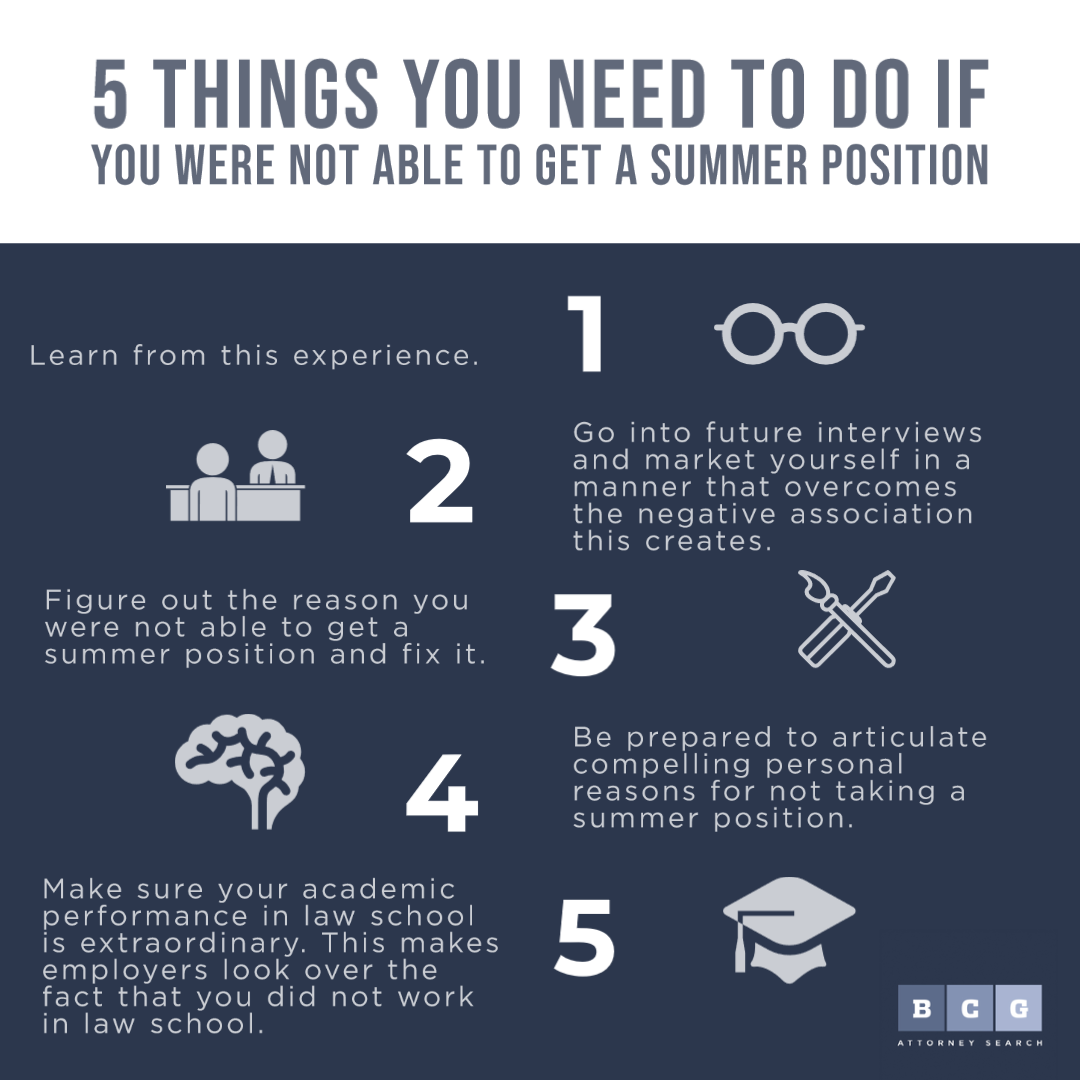A. Overcoming the Potential Negative Associations of Not Working During the Summer
If you did not work in the summer, the perception of many employers will be that you may not have been able to get a position, or had no interest in getting such a position. These objections are something that will be important for you to overcome.
1. If you were not able to get a summer position
If you were not able to get a summer position, you need to do a couple of things. First and foremost, you need to learn from this experience. Secondly, you need to go into future interviews and market yourself in a manner that overcomes the negative association this creates.
If you tried to get a summer position and did not, you probably have spent a lot of time thinking about why this occurred. Your grades are high enough to suggest that you likely should have had some interviews during law school. Did you interview poorly? Was there something wrong with your resume? Were you too selective in terms of the employers you approached? Whatever the problem or problems were, they need to be fixed.
A summer position is one of the more important stepping stones in many attorneys' careers. It is also much like applying to law school: Some make the cut and others do not. Your objective should be to overcome the negative associations of your failure to achieve this milestone by creating the impression that whatever you did benefited you more personally than a summer position might have.
This might be a simple task. If you had to spend time with a parent, did significant volunteer work, or something that in the short term would take precedence over a legal career (that is likely to span several decades) this should not be much of a problem. In other words, if you can articulate compelling personal reasons for not taking a summer position, this will be something that employers are likely to respect. If this is the case, you should be honest and forthright.
However, if there were not compelling personal reasons for you not working in the summer-and you simply did not get a position-you need to explain what you did in the summer in a way that is compelling. We have heard stories of attorneys who spent the summer hiking between their second and third year, who spent the summer working in a role unrelated to the law in a family business-you name it. If this is the case, one of the easiest explanations to give is that you knew you were going to be spending the rest of your life practicing law and wanted to take the summer off (i.e., relax) before commencing your legal career. For many employers, an answer such as this will be more than sufficient. However you approach this subject, your answer should be honest. If you can say this confidently, many employers may overlook that you did not hold a summer position.
In addition, it is important to note that your academic performance in law school, if extraordinary (or marked by increasing and significant improvement) is something that will make many employers look over the fact that you did not work in law school.
Finally, it is worth noting that the practice of law-as well as life-is much like a race. If you could not get a position during law school, you are likely to be much hungrier and resourceful at this point in your legal career than you might otherwise have been. You are also likely to appreciate your first job more than you might otherwise if you did not have a legal-related job during law school. Make the most of this!
2. If you did not have an interest in pursuing a legal-related position during law school
Many attorneys simply do not have an interest in pursuing a legal-related position during law school. For example, they may have gone to law school with no interest in ever being an attorney. In addition, they may have worked during law school and attended law school at night, for example. However, because UCLA does not have a night program, if you were not interested in working as an attorney during law school you may need to rethink a few things.
If you did not have an interest in being an attorney during law school, why now? People who do things for the wrong reasons almost always do not end up doing well at what they seek out to do. This is probably the same thing you saw some of your fellow students at UCLA do who simply dropped out of law school. Suddenly deciding you want to practice law is something that is quite rare after a few years of law school. You are going to need to do some real introspection in terms of thinking about your reasons for wanting to practice law.
Let's assume that you had some meaningful life experience while at UCLA that suddenly has convinced you that you want to practice law. This is certainly something that is possible. It has certainly happened to many law students before you. If this is the case, it is not something we would recommend emphasizing too much in your job search.
For one, it makes your decision to attend law school something that may appear not well thought out. In addition, it raises the suspicion in an employer's mind that you do not have a single-minded obsession with practicing law. While this may not sound like something that is all that serious, it is in fact quite serious. Law firms want people practicing with them who are dedicated to their work and are convinced they want to be attorneys. The possibility that you might one day simply change your mind about your career path is not something legal employers want to think much about. Especially when there are so many lawyers out there who are likely to feel the opposite.
If you did not want to be an attorney during law school and now do, you are going to need to market yourself to employers in much the same way you would if you did not get a position during law school because you could not. There are numerous reasons people many not work in legal-related positions during the summer in law school. Whatever the reason, you need to advise employers of something that is true and yet does not shed a great deal of negative light on you. Above all, you must show every prospective employer that you have the potential to be committed to your work and have the potential to succeed. Some law firms can be quite empathetic if you have other skills that set you apart. These skills should become the focus of your job search.
B. The Best Strategy for Getting a First Position
Given the caliber of law school you attended, you are almost certain to find employment. For purposes of this answer, I would not be too concerned about your law school grades. You are likely not finding employment because you are simply not being aggressive enough in your search. This alone is cause for concern-but we will not address that in any great detail here.
We do not need to tell you that the incoming classes at the most prestigious and highest paying law firms are going to be filled with people who were also summer associates at these firms. Accordingly, you are not likely to have much success by approaching these firms right now. We suspect these types of firms have been the focus of your search thus far. Nevertheless, if you have not contacted these types of firms yet we would recommend contacting them on the outside chance that they may have a position available. You never know.
As a fresh law school graduate, you are unlikely to have much luck conducting your search in the classified sections of legal newspapers or on job boards. Again, however, we would recommend trying this.
If you did well in certain classes in law school, there may also be professors who will provide you recommendations to people they know inside certain law firms. In addition, your career services office at your school may be of some help. You may have networking sources of your own you would like to use. Use all of these sources.
In our opinion, your best strategy for getting your first position will be to aggressively market yourself to the types of firms for whom you would like to work. You can do research on Martindale, use an outside marketing service like Legal Authority (www.legalauthority.com), or any number of methods to find the proper contacts inside the types of legal hiring organizations with which you would like to work. When you do market yourself, you should also do it all at once and at that time contact as many employers doing the type(s) of work you would feel comfortable doing. In this way, you will be able to compare firms and their different cultures, salaries and make the best decision among the options you have. You should have several options.
C. Conclusions
Not having a summer position or worked during a legal capacity during law school is a difficult obstacle to overcome. Nevertheless, because you attended UCLA and did well enough there, you are almost certain to find a legal position. Your best way for doing this in our opinion is through marketing yourself to the types of employers you would like to work for. While you are likely to get a position, your chances of landing with a top tier firm are severely minimized by the fact that you did not work with a top firm during the summer.
Learn the 10 Factors That Matter to Big Firms More Than Where You Went to Law School
Of utmost concern to employers will be the reasons why you did not work during the summer. This is something you only know the answer to. Whatever the reasons are for this, it is something you need to address in an honest and effective way. You will get a position; however, at this stage of your career you are now ''under the gun'' so to speak. How you handle this stage of your life will, in some respects, determine the type of legal career you are likely to have.









